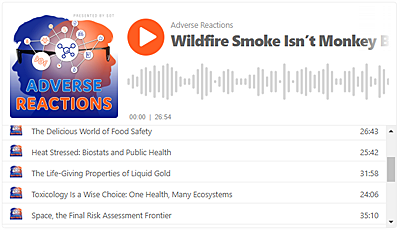
The SOT Adverse Reactions podcast just finished releasing its second season of episodes. You can listen to each episode of Season 1 and Season 2 on the Adverse Reactions website or any major podcast distributer, including Apple Podcasts and Spotify.
Season 2 of Adverse Reactions features nine episodes.
Space, the Final Risk Assessment Frontier
How do you set exposure limits to protect human health in a closed container floating in space? Valerie Ryder, a toxicologist at the NASA Johnson Space Center, takes co-hosts Anne Chappelle and David Faulkner into the small world of space toxicologists, where they also discuss research involving lunar dust, bone loss, and CO2.
Listen Now >
Toxicology Is a Wise Choice: One Health, Many Ecosystems
Studying the effects of metals in whales and alligators, among other species, can offer immense insight into human health, John P. Wise Sr. tells Adverse Reactions co-hosts Anne Chappelle and David Faulkner. Dr. Wise also discusses research on chromosome instability and how you can help people everywhere make connections to the importance of environmental health.
Listen Now >
The Life-Giving Properties of Liquid Gold
With limited existing research on the effects of medications and exposures on lactation, Christina D. Chambers, University of California San Diego, shares work underway to better assess risks and benefits for mom and baby. Co-hosts Anne Chappelle and David Faulkner also discuss with Dr. Chambers the tricky roles of epidemiology and observational studies.
Listen Now >
Heat Stressed: Biostats and Public Health
Biostatistics or data science for public health—whatever you choose to call it—informs understanding of the health and environmental impacts of exposures. Emory University’s Howard Chang discusses with co-hosts Anne Chappelle and David Faulkner the intricacies of interpreting data, the controversial P value, and the team science involved in studying public health challenges.
Listen Now >
The Delicious World of Food Safety
Even chocolate companies and wineries need toxicologists. Alexandria G. Lau, ToxStrategies Inc., has worked for both and shares her experiences with co-hosts Anne Chappelle and David Faulkner. They also discuss the research and development that goes into new food products and how toxicologists play a role in food safety.
Listen Now >
Lions and Vultures and Tox, Oh My
How human activity, chemical exposures, and environmental factors combine to contribute to wildlife population declines is at the forefront of the research by Dr. Caroline Moore and other teams at the San Diego Zoo Wildlife Alliance. Dr. Moore unravels the role of toxicology in wildlife conservation with co-hosts Anne Chappelle and David Faulkner.
Listen Now >
Anthropogenic Ghosts on the Coast
While no longer national news, the Deepwater Horizon oil spill is still impacting the ecological health of the Gulf of Mexico and the livelihoods of the communities that rely upon the gulf’s aquatic life, as Robert “Joe” Griffitt of the University of Southern Mississippi reveals. Dr. Griffitt and co-hosts Anne Chappelle and David Faulkner discuss how ecotoxicology is both an applied and a basic science, as well as how scientific discovery is not always a linear process.
Listen Now >
Sweating It Out: Exercise versus Toxic Exposures
With nonalcoholic fatty liver disease affecting nearly a third of the US population, Luma Melo, University of Pittsburgh, describes how mouse studies have shown that low-impact exercise can help reverse liver damage. Dr. Melo also shares with co-hosts Anne Chappelle and David Faulkner how research funding works in her native Brazil and the role of Brazilian women in toxicology.
Listen Now >
Wildfire Smoke Isn’t Monkey Business
Because of natural exposure to wildfire smoke, nonhuman primates have provided an increased understanding of the long-term effects of smoke inhalation during infancy, shares Lisa Miller, University of California Davis (UC Davis). Dr. Miller also discusses with co-hosts Anne Chappelle and David Faulkner the importance of animal models in human health research and how nonhuman primates can be good models for vaccine testing, as was the case with COVID-19.
Listen Now >
#Communique:ScienceNews#Communique:SOTNews#Members